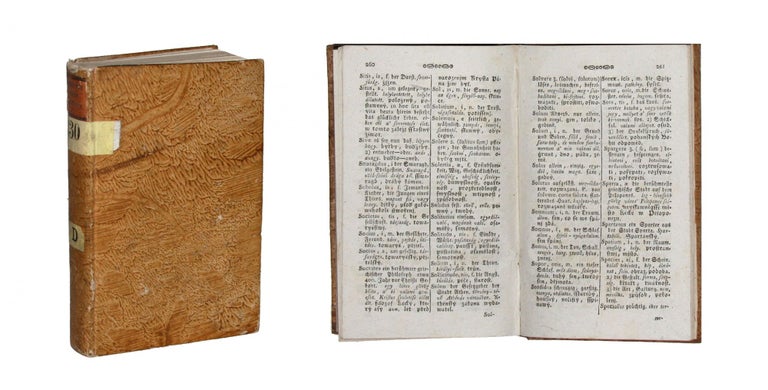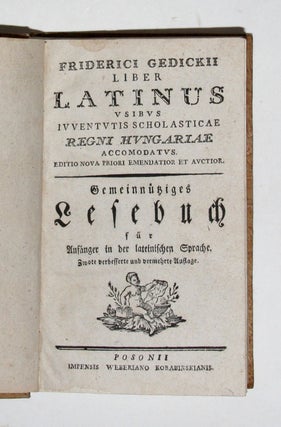Liber Latinus usibus iuventis scholasticae Regni Hungariæ accomodatus / Gemeinnütziges Lesebuch für Anfänger in der lateinschen Sprache.
12mo. (1) 285 pp. Bound in contemporary patterned papered boards with embossed title label on spine. Light yellow staining to upper margin of 25 leaves, otherwise a genuine, immaculate copy. Very rare edition of Gedike’s instructional book for students of Latin in the Kingdom of Hungary. The work is divided into two parts: a selection of example passages with occasional explanatory notes, and a Latin-German-Hungarian-Czech dictionary. The present copy is the enlarged second edition, of which we have only been able to locate one other copy (Frankfurt’s Universitätsbibliothek Johann Christian Senckenberg). We have been unable to trace a copy of the first edition. After a series of fables in Latin and German – clearly the preferred tongue in this linguistically imperialistic empire – the work moves onto descriptions of domestic and exotic animals, the elements, meteorology, astronomy (including the recent discovery of ‘Herschelio’ [Uranus]), health and anatomy, and Greek mythology. Of interest are the occasional notes to teachers included in Gedickus’ texts instructing them in how to present the lesson. The greatest section of the book, however, consists of a tetra-lingual lexicon of the words occurring in the pedagogical texts. The Liber Latinus appears to be the first lexicon with this combination of languages. Like Jirí Palkovic’s Czech-Latin-German dictionary of 1821, which boasts “the addition of Slovakian and Moravian expressions,” Gedike supplements his Czech definitions with occasional Slovak variants. An accomplished linguist, Gedike would have taken an interest in the movement to revive and document the Slovak language, which was beginning in earnest at exactly the time that he first published his lexicon; the first Slovakian newspaper and first Slovak adventure novel appeared the same year. Like the Liber Latinus, these were published in Posonii, modern-day Bratislava, the center of the Slovakian independence movement. The next lexicon combining Latin, German, Hungarian, and Czech/Slovak would not appear until 1825, when Anton Bernolák published his multi-volume Slowár slowenskí cesko-latinsko-nemecko-uherskí. Friedrich Gedike (1754-1803) was an educational reformer, theologian, and campaigner for Prussian independence. He published several translations of classical works, corrected the proofs of Goethe’s Wilhelm Meister for Berlin publisher Johann Friedrich Unger, and wrote extensively about educational reform, where he left his mark by helping to create the German graduation examination, the Abitur. He has been the subject of several 20th century monographs on German educational reform. * Senckenburg number 18/24695
Price: $1,875.00


